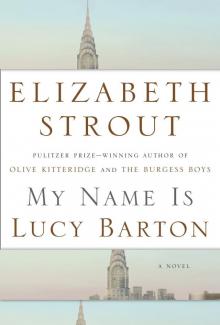- Home
- Elizabeth Strout
Abide With Me Page 8
Abide With Me Read online
Page 8
“Get your coats,” Charlie said. “We have to go to school.”
CONNIE RODE ALONGSIDE Adrian in his new red truck, its shiny hood spread before them through the windshield. Where the road narrowed, tips of branches touched the window next to Connie. The skies this morning were pale, and the leaves that remained seemed richer, serious, not so screechingly proud of their beauty as on those sunny, blue-skied days.
“I’ve got to plant those tulip bulbs for your mother,” Connie said, “before the ground gets frozen.” There was no answer, and she had not expected one. Adrian reached to switch gears at the corner, and the gearshift, long and skinny as a golf club, moved under his big hand. She glanced at his immobile profile, his strong chin, the ruddy cheeks, the slight puffiness under his eyes that had increased over time. She looked out the window again. The overcast sky was not low; it stretched above the fields and trees and stone walls in the distance. Connie had the sense of a big cake cover—a glass dome—placed down over the world of West Annett; but inside was no cake, just hollowness. Her body swayed slightly as the truck turned onto Stepping Stone Road.
FROM HIS STUDY, Tyler sat watching as a nuthatch hopped along the birdbath’s edge, bathed one wing in a quick flurry. A fat chickadee joined the splashing, then sat still as a stone. It seemed to Tyler he had not noticed birds in quite some time, that in a peculiar way he was not noticing them now, only remembering them. Was there not a time when cheerfully and without a care you were glad with the glad? A book of Kierkegaard lay open on his lap. He closed it slowly, saw how, beyond the birdbath, the hills with their remaining leaves held patches of yellow amid deep red; and closer, were the dried stalks of parchmenty corn in the Langleys’ field. Tyler turned back to his desk.
It was the minister’s habit, once Katherine went off to school, to devote the first hour of his day to prayer and meditation: My voice shalt thou hear in the morning, O Lord, and this included intercessionary prayer for his congregation. Deliver the needy . . . they walk on in darkness. But this morning he was troubled by a memory: When he first arrived in town, he had told his parish that anyone caring to expand his life of prayer should come to speak with him. Rhonda Skillings had taken him up on this offer, arriving in his office wearing a plaid sweater vest and sitting forward on the chair. They had discussed the fourth-century practice of contemplative reading, lectio divina, and he had spoken of Augustine and Tillich and Niebuhr—and Bonhoeffer, of course. He asked if she would like to start a prayer group, and she had smiled and said she didn’t think so. She mentioned she’d been Phi Beta Kappa in college. She had not come back.
Tyler’s eyebrows drew together as he thought of this now, looking to his desk, straightening some papers. He needed to call Doris Austin this morning, while Charlie was at work. But he heard the heavy tires of a truck in the gravelly driveway, and he rose to greet his housekeeper.
He found her hanging her long sweater in the back hall closet. He said, “Good morning, Mrs. Hatch.” Unexpectedly, a real shyness overtook him.
But she was what she had been, a tall, not-young woman, whose green eyes looked at him with tired pleasantness. “Good morning,” she said. “Nice day out there. Overcast. But nice.”
It seemed a calmly played middle C hung in the air between them. “Yes, a nice day after that rain.” He stood back to let her by. In whose spirit there is no guile, he thought.
“I’ll put some laundry in,” Connie said. “Then go get started on the bathroom upstairs.”
“Thank you,” Tyler said.
Sitting in his study, he could hear the bathtub faucet running, the occasional knocking of the plastic bucket, her footsteps overhead as she walked back and forth between the linen closet and the bathroom. In the mudroom, the washing machine stopped chugging and, with a noisy whine, began its whirring spin. He worked again on his sermon, On the Perils of Personal Vanity, quoting from Tolstoy’s Gospel in Brief: “The house of God is not the church building, but the whole of God’s people.” He could not think of a next line. Anxiety—familiar and tiresome—pressed at his eyes. He touched his fingers to his mouth. Let not the heart in sorrow sin. He dialed the phone of the Austin home; nobody answered.
When he heard Connie descending the stairs, he went into the kitchen. “Mrs. Hatch,” he said, “join me for a cup of coffee.”
“I’ll just run these through the wringer first.”
He leaned against the doorway of the mudroom while she fed the clothes into the old beige rollers fixed above the tub of the machine. Katherine’s pajama top came out flat. Connie tossed it in the laundry basket.
“Say—Mrs. Hatch,” Tyler said, jiggling change in his trouser pocket, “how did you learn the alphabet?”
“I’ve no idea.” Her hands were back in the washing machine. “No memory at all.”
“No—me, either.” He watched while his new white shirt went through the wringer, and added idly, “Bonhoeffer said our ability to forget is a gift.”
“Then I’m gifted.” She turned with a brightness of a smile that changed her face into a youthful one; but the smile seemed to exacerbate some sadness in her eyes, and he was surprised, once more, by her effect on him; he had to look away.
“It’s only that Katherine’s teacher’s irritated because she doesn’t know the alphabet,” he said.
“Oh, she’ll learn it,” Connie said. She unscrewed the hose from the faucet. “I expect the child won’t grow up illiterate.”
Tyler stepped back to let her by. “I expect you’re right,” he said, following her into the kitchen, where he seated himself at the kitchen table, his long legs out to the side. He watched while she poured the coffee, brought out a box of doughnuts. “Mrs. Hatch,” he said, “tell me about yourself. Do you come from around here? Perhaps you’ve said—I’m sorry.”
“A little town called Edding, farther up the river.” Connie sat down and drank her coffee with a deliberate sip.
“Oh, yes. I’ve seen signs along the turnpike.”
Connie couldn’t recall anybody ever saying, “Tell me about yourself.” She didn’t know what to tell. In her mind, she was a faint pencil line on a piece of paper; everyone else was drawn in ink, some—like the minister—with a firm Magic Marker.
“Do you have brothers and sisters?”
“An older sister, Becky. She lives way up north.”
“Do you see her often?”
“No. Becky had some problems.”
Tyler nodded. The morning sun, breaking through its white overcast, showed for a moment on the chrome edge of the table.
“And I had a younger brother, Jerry. Twelve years younger, so he was like my little boy.” She looked at Tyler, her green eyes wide, as though something painful had surprised her.
“Nice for him,” the minister said. “Big age difference like that can be nice, I think.”
“Well, I did love him. He had that. My mother was sick of life by then, sick of kids and dogs, she said. ‘No more kids and dogs,’ she’d say. She’d lose her temper over anything. We had to stay out of her way. And I took care of Jerry.”
“Then he was lucky to have you.”
“He died in Korea. Nine years ago, next week.”
“Oh, Connie.”
To say her name like that! She bent her head and drank her coffee.
“Oh, I am sorry, Connie.” Tyler shook his head. After a moment he said, “Boy, MacArthur made a mess of all that. Such arrogance, sending in those kids not trained.” Tyler turned his coffee mug around slowly in his hand.
“Well, he was trained. He joined up before, you know. He wanted to fight the Germans overseas. But he got a desk job stateside, and never saw any action.” Connie had to wait a moment; she felt a moistness in her eyes. “He said that made him feel like a sissy. So when the next damned war came along—” She shook her head, and saw that the minister was watching her kindly. “That’s the part that gets to me,” she said. “He didn’t have to go to Korea. Just did it so people wouldn’t think he was a s
issy.”
“Oh, that is sad.” The minister grimaced.
“I was packing him a box,” Connie said. “I’d knit some red mittens, and made some fudge, and I was packing the box for him, when Adrian drove up in the middle of the day—and then I knew. I just knew.”
Tyler nodded.
“I had Adrian take the box away, couldn’t stand to look at it.”
“Oh, of course,” Tyler said.
Connie wiped her mouth with a napkin. “It still doesn’t feel real,” she told Tyler, looking at him with puzzlement.
Tyler watched her. After a moment he put his chin in his hand. “Funny feeling, isn’t it,” he finally said.
“It was cold over there, you know,” Connie said. “Thirty degrees below zero. They had to piss on their rifles to get them to work.”
“Awful,” said Tyler, startled at the word “piss.” He shook his head meditatively. “Just an awful mess. I am sorry.”
“A few years back I went to visit a man at Togas hospital—he was Jerry’s officer. I thought if I could talk to him, you know, see what it had been like, it would feel more real to me.” Connie shook her head, pushed back her coffee cup. “But, sheesh—”
“What’s that, Connie?”
“Oh, the fellow just sat in a wheelchair all day, trembling, smoking cigarettes. They had to put his wheelchair against the wall, ’cause he was so scared someone would come up behind him. Just sat there, trembling.” Connie drummed her fingers on the tabletop. “Hard to think he was an officer. At least Jerry didn’t end up like that.”
“No,” Tyler said. “At least he’s not suffering.”
“That’s right.” Connie’s voice got louder as she said with sudden urgency, “And that’s the point, isn’t it? That’s exactly the point.”
“Point? Point of what, Connie?” A sudden, vague uneasiness moved through him.
Connie’s eyes had moistened. She looked at Tyler. “That this man’s life is no life, is it? No life at all. Worse than death, if you ask me. He can’t even talk. They’d wrapped him in freezing sheets once, the nurse said. Try and shock him out of it. But it didn’t work. I say that’s no life. Don’t you think it’s better to be dead?”
“Seems that way sometimes, I guess. Maybe they’ll be able to help the fellow.”
“They can’t help him,” Connie said. “Were you in the war?”
“Just the tail end. It was over, really.”
“I see.” Connie nodded. Her voice had returned to its normal pitch. “Were you sent off overseas somewhere?”
Tyler leaned back in his chair and talked about his year in the navy in Guam, doing cleanup operations; the war had just ended. He told how his father had died while he was on the train coming back from San Francisco. “What I didn’t know about death,” Tyler said, squinting at his fingernails, “was that it was not just the death of my father, but the death of my childhood, the death of the family as I’d known it. It reminds me of Glenn Miller’s plane disappearing above the channel. Not just the death of a bandleader, you see, but the death of a band.” He looked out the window. “That’s what death does. If that makes any sense.”
“Well,” Connie said, tapping her spoon loudly against the table, “truthfully, none of it makes sense. Not to me. Let me ask you a question.” The minister turned and raised his eyebrows. “Does it make it better to—you know, have these deaths happen—if you’re a minister?”
He gazed at her for a moment. “I don’t think so,” he said.
She nodded, looking down at her spoon, and he thought he saw a spasm of bewilderment and fear pass over her face—a moment of nakedness.
“What is it, Connie?”
She said, “I just thought of something. Alpha-Bits cereal. I’ve seen it in the grocery store and it might get Katherine interested. Spell out her name in the cereal bowl.”
“Say,” said the minister, “that’s a swell idea.”
“I have to go back to the grocery store soon for Evelyn. I’ll pick it up. I was to go this weekend but there was trouble with the car.”
“Oh, cars can be a nuisance,” Tyler said. “Dad had a car that hated rain. Every time it rained, that car wouldn’t start.” As he remembered this, a faint sweetness of feeling arose in him.
“Car’s a nuisance all right,” Connie said. “Say, look. I found this in the back of the linen closet upstairs. It must belong to Katherine.” From her sweater pocket she brought out a small gold ring, and held it between her fingers. A tiny red stone was set in it.
Tyler looked at it carefully. “Doesn’t look familiar. Are you sure it’s not yours?”
“Oh, heavens no. Why would I have a child’s ring? Maybe it’s been here a hundred years. Anyway, give it to Katherine.”
“Well, thank you, then.” He took the ring, turning it in his fingers. “Say, Mrs. Hatch, I just wondered—I wondered if you might want to babysit full-time. If I brought Jeannie here to live. I’d like to have the girls together.”
To his surprise, the woman blushed.
“Just a thought,” he said easily. “It’s going to take me some time to get the details worked out.”
“Oh, I’d like that a lot. I would.”
“Well, let’s keep it in mind.” He slipped the ring into his pocket. “Thanks for suggesting the cereal and picking it up for me. I’d forget it, I’m sure. My mind is like a sieve.”
“Mine, too.” Connie nodded, and gave him a smile so warm and sudden that Tyler had a momentary sense of seeing a younger version of herself come forward in her older face. She stood up, put the coffee mugs in the sink, stepped into the mudroom.
Tyler heard the plastic laundry basket move across the floor.
HE HAD MARRIED a summer girl. Almost never—plenty of people would have told you this—was that a good idea. He had married a summer girl from Massachusetts, and that alone brought complications. Had Lauren been from New Hampshire, better still, Vermont, it probably would not have mattered. But to come from Massachusetts meant a certain kind of crassness, most likely money, probably cocktails, and Massachusetts people were the rudest drivers in the world.
But what’s a man to do when Love appears before him?
Tyler, sent out into “the field” as a seminary student, had initially been dismayed at the paucity of the congregations in some of the outlying, isolated towns. On his first day of student preaching, there had been six people sitting before him—one of whom, he realized very soon, was what was referred to (easily, in those days, without apology) as the town idiot. But Tyler grew used to this, adjusted even to the fact that such a person would often get up and leave during the service. He understood the inability to sit still, for there was inside himself a restiveness.
That’s where he had learned to preach, in those small white churches sometimes as far as one hundred miles from the Brock-morton Theological Seminary. Free from homiletics class, free from the self-consciousness of standing before the grim professor, free from the lack of charity he sensed in some of his classmates, Tyler found his voice, speaking to the small congregations, sometimes stepping back from the pulpit to move more directly in front of them, to quote the simple verse from Daniel: Do not be afraid, for you are deeply loved by God. Be at peace; take heart and be strong.
And because reports of approbation came back to the field director at Brockmorton, Tyler had been sent to preach in a coastal town too small to support a full-time minister year-round, but whose congregation rose like an ocean swell during the month of July because of the summer people from out of town. Out of state.
Picture: A day in early July, warm enough that the door to the church is left open, and the windows in the sanctuary are open, too, so the sweet, warm air of the morning is there inside the small village church built two centuries earlier. Beside the church is a rose garden, where a few tea roses are still in bloom, and on this Sunday the gloriosa lilies are draping over the trellis, and there are white Madonna lilies, too, which send their smell into the church in the w
arm, clear air. Every pew is filled—mostly with people who have come over from the Auburn Colony, or up from Massachusetts or Connecticut to spend part of their summer here. In church today, wearing a blue dress and a blue hat, is the beautiful Lauren Slatin, a summer girl, seated next to her father, who is broad-shouldered and serious. But the beautiful Lauren has none of her father’s soberness—she is all color, all light, a light shines from her face, from her eyes, as she stares at the young Reverend Caskey—and what a sermon he delivers! He has never felt so powerful, his eyes intense, his cheeks flushed. They are in love by the benediction.
Was this God’s will? It was. They were lifted up into the wondrous arms of God, for God is love, and love filled Tyler to the point of dizziness when he visited the Slatin cottage a few days later, Lauren standing on the grass in a blue gingham dress. And when autumn arrived and the letters showed up in his mail slot outside the common room at Brockmorton, he would open them right there, his heart thick with love as he read the large, uneven handwriting, whose surprising untidiness touched him deeply. There had been those rare and splendid long-distance phone calls made from George Atwood’s home in the evening (Tyler always careful to ask George about the bill so that George never had to raise it himself), waiting, waiting in the quiet of the study for that sparkle to flash through the phone. “Hello?” Oh, it was God’s work. Love is always God’s work.
“A local boy?” Mrs. Slatin had said, her pretty brown eyes smiling at him.
“A country club?” Margaret Caskey had said. “They belong to a country club? Tyler,” she said quietly, “rich people are like Negroes. They’re fine. There is nothing wrong with them. But I say, and I have always said, let them live their lives, and I will live mine.”
He understood—as he stared out his kitchen window now—that on both sides of the aisle on the day of their wedding was the unspoken understanding that each was marrying down.
A FEW WOMEN from the Ladies’ Aid were gathered for coffee in the living room of Jane Watson’s clean house. This kind of thing gave the women something to look forward to, especially now that the days were shorter and darker, and the boredom of changing sheets or cleaning a bathroom could sometimes mushroom into a private despair before noontime even arrived. Having coffee allowed the women to show off a new sweater, a clean house, exchange recipes, and swap the latest news, which now included the misbehavior of Katherine Caskey. Bertha Babcock—the bossy, old retired schoolteacher who could be a disapproving presence when gossip began—was, thankfully, not at Jane’s today, so the details of Katherine could be gone over with some relish. The fact that Tyler had sent Mary Ingersoll home in tears seemed quite remarkable, although Doris Austin, reaching for a blueberry muffin, said, “What makes that remarkable?” The fact the child had said, “I hate God,” during the Lord’s Prayer was remarkable as well, and Jane Watson, tapping her cigarette into a plaid bean-bag ashtray, said Tyler should be told.

 The Best American Short Stories 2013
The Best American Short Stories 2013 Abide With Me
Abide With Me My Name Is Lucy Barton
My Name Is Lucy Barton Olive Kitteridge
Olive Kitteridge Anything Is Possible
Anything Is Possible Olive, Again (ARC)
Olive, Again (ARC) Olive, Again
Olive, Again